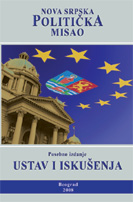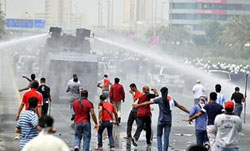| NSPM in English | |||
Riyadh Scores One for Tehran |
 |
 |
 |
| уторак, 29. март 2011. | |
|
(The National Interest, March 21, 2011)
The democratic currents sweeping the Middle East have created unease, even consternation, in Washington and European capitals. These democratic governments all formally welcome democracy in the Arab world, but fear losing friendly tyrants with whom the West long did business. Libya was an easier case, at least in the U.S., since American support for Muammar Qaddafi was minimal. Despite the lack of U.S. security interests at stake, a no-fly zone seemed to offer the possibility of defenestrating a corrupt and anti-Western tyrant. The real test of American commitment to democracy is long-time ally Saudi Arabia. U.S. and Saudi Arabian troops conducted a joint military training exercise in early March. Riyadh acts as the critical “swing” oil producer, upon which Washington long has relied to stabilize the international oil market. Saudi Arabia also is a major arms buyer. Perhaps most important, the Saudi royals have spread their wealth around Washington, collecting many influential friends. Unfortunately, Riyadh also is essentially a totalitarian theocracy. A handful of feeble gerontocrats rule and 7,000 princes mulct a nation of 27 million. There are no elections or civil liberties and non-Muslims cannot even freely worship at home. The Saudi government underwrites fundamentalist Islam around the world and Saudi citizens have provided substantial financial support for terrorism. Yet U.S. officials say little to encourage the Saudi royals to adopt democratic reforms. Not that the well-heeled princes are interested in American political values. “They’re not in a mode for listening,” one administration official recently told the New York Times. The regime in Riyadh always has used whatever force was necessary for self-preservation. Now Saudi Arabia has adopted Washington’s strategy of imposing its values abroad, moving troops into neighboring Bahrain. Riyadh intends to stifle Bahrain’s growing democracy movement and preserve the Khalifa family dictatorship.
The Persian Gulf is filled with kleptocratic monarchies, of which the Kingdom of Saudi Arabia is the preeminent example. The Kingdom was established in 1932 by Abdul-Aziz bin Saud, or Ibn Saud. It was a nation born of blood and coercion, but that posed little problem at a time when even Western countries did not worry much about encouraging freedom elsewhere. Oil was first discovered in 1938. Over the years the Saudi monarchy developed particularly close relations with Washington. The perceived threat from radical Islamists, highlighted by the 1980 seizure of the Grand Mosque in Mecca, caused the royal family to more strictly observe Sunni Islam in public while continuing to enjoy a licentious, sybaritic lifestyle in private. The regime has maintained absolute political control, rejecting elections as “not consistent with our Islamic creed.” Even King Abdullah’s tepid reforms have engendered strong opposition within the royal family. The regime’s future looks uncertain. Power is concentrated in the sons of Ibn Saud. However, the aging half-brothers tend to divide along matrilineal lines. Today both the king and crown prince are elderly and ill. Soon, the succession will have jump to the next generation, with unpredictable consequences. Tribal and regional divisions add to the potentially combustible mix. The Kingdom would appear to be an obvious target for U.S. efforts at democratization. Yet even the Bush administration did not push the Saudis to reform. There were no meetings with dissidents, no criticisms voiced by visiting American leaders, and no cool reception of Saudi officials. Riyadh was horrified by the eruption of democracy protests in the Middle East. New information technologies make it impossible for the royals to hide pervasive corruption, mismanagement, and poverty from their citizens. But the regime, buttressed by the army and a well-armed National Guard, has avoided mass demonstrations. Small crowds have gathered in a number of cities, especially in the east where the Shia are concentrated, only to be quickly dispersed. As foreign protests spread, the king announced $36 billion in social spending. The regime also arrested critics and placed security forces on high alert. Only a few brave souls turned out for an internet-promoted “day of rage” in early March. The Saudis had less success in slowing regime change abroad. Riyadh offered asylum to Tunisia’s President Zine El Abidine Ben Ali and support for Egypt’s President Hosni Mubarak. The Saudis were particularly upset that the Obama administration did not back Mubarak, as if Washington could have saved the geriatric dictator. Now the Saudis are directly meddling in neighbor Bahrain. The Khalifa family rules the small country of 600,000, representing a thin Sunni covering over a mostly Shia population. The disenfranchised majority began taking to the streets after the eruption in Tunisia. The Bahrain government responded violently last month, causing many protestors to demand the end of the monarchy. Washington endorsed the “universal rights” of Bahraini citizens but counseled moderation—after all, the country hosts America’s Fifth Fleet. But offers of dialogue did little to assuage popular anger. Protests increasingly disrupted the capital and surrounding villages. Bahrain has but 9,000 men under arms, raising questions about the regime’s ability to survive. Riyadh worried about Shia activism spreading to its Shia minority, many of whom live in the oil-producing Eastern Province connected to Bahrain by a 16-mile-causeway. The Saudis also feared Iranian support for Shiites against Sunni-ruled regimes.
The Saudis claim to have entered only to protect “infrastructure” in Manama, Bahrain’s capital. But the protests threaten Bahrain’s monarchy, not government buildings or oil facilities. One unnamed Saudi said the “forces are not there to kill people.” However truthful that intention, the result could end up being far different. UAE’s Foreign Minister Abdallah bin Zayid al-Nuhayyan said military intervention was meant to “help both the Bahraini government and the people to reach a solution,” but that would only be a solution on the Khalifa family’s terms. The outside forces are seen by Bahrainis as an attempt to intimidate protestors. Nevertheless, the initial public reaction was defiance as 10,000 Bahrainis marched on the Saudi embassy to condemn what many called an “occupation” of their country. One protestor told the Washington Post: “There’s no talk about dialogue. The topics have changed in the last 24 hours.” The king declared martial law. Several people were killed when Bahraini troops used tanks and helicopters to clear a tent city organized by protestors. Jasim Husain, a member of the al-Wefaq opposition party, said “It’s like a declaration of war on the people who are engaged in a peaceful protest demanding basic rights.” Resentment against the foreign forces is likely to intensify. “People are preparing themselves and we are ready to fight back if any attacks come,” one student activist told the Wall Street Journal. If Saudi or UAE forces end up gunning down Bahraini protestors, the anger may become unquenchable. Riyadh’s “occupation” is likely to undermine and could even destroy the Bahraini monarchy. This radicalization of people who originally wanted reform could spread elsewhere in the Gulf. Indeed, the Saudis risk playing into Iran’s hands. Riyadh blames Iran for promoting Shia unrest, but Afshin Molavi of the Woodrow Wilson Center reported that “Iran is not the driving force in these actions.” Unfortunately, Saudi meddling will push protestors across the spectrum toward Tehran. Warned Jasim Husain, “For the Saudis to be here is a challenge to the Iranians. It is something we want to avoid.” Riyadh has given Iran an excuse to turn Bahrain and other Gulf states into an international battleground. Riyadh’s action also risks roiling Iraqi politics. Anti-American Shia leader Muqtada al-Sadr has called for protests against the Saudi move. Even Grand Ayatollah al-Sistani, the most revered Shia cleric who normally avoids politics, criticized the Bahrain government’s crackdown. The Saudi move threatens even greater polarization between Sunni and Shia throughout the region. Yet the Obama administration has muted its reaction. Washington denies popular suspicions in Bahrain that Washington and the Khalifa government discussed the Saudi move when Defense Secretary Robert Gates visited Bahrain beforehand. Still, when pressed, the administration refused to criticize Riyadh. “This is not an invasion of a country,” explained White House press secretary Jay Carney. Washington reserved its advice for Bahrain. After the Saudi and UAE troops arrived, the U.S. inveighed against “the use of force and violence from any source,” urged “calm and restraint on all sides,” and advocated political dialogue. The administration later complained of the Khalifa government’s “excessive force and violence” against protestors. Secretary Clinton added: “the sooner they get back to the negotiating table and start trying to answer the legitimate needs of the people, the sooner there can be a resolution.” But that obviously is not the kind of resolution sought by the Bahraini or Saudi monarchies. Washington has no good policy options. So far the Saud monarchy looks resilient, but the U.S.-Saudi relationship is under strain. One unnamed administration official observed: “They’ve taken it [the failure to support Mubarak] personally because they question what we’d do if they are next.” What would “we” do? The biggest challenge facing the Saudi royals is internal, namely their lack of legitimacy. They can be expected to respond to future threats with no less brutality than that deployed by the Iranian regime against its opponents. Explained Saudi Interior Minister Nayef bin Abdul-Aziz, effectively second in line to the throne: “What we won by the sword we will keep by the sword.” If the regime is challenged, it undoubtedly would expect Washington’s support. And many Washington interests would advocate such a course. However, the administration could hardly endorse a regime which violates most every principle for which the U.S. stands. There’s not even a reform fig leaf for Washington to hide behind. Riyadh’s intervention in Bahrain raises the stakes. The Pentagon has authorized the removal of military dependents and non-essential civilians from its Bahraini base, suggesting some doubt about the future of Khalifa family rule. If the latter survives only with the assistance of Saudi bayonets, Riyadh will have committed a form of aggression. What then of the West’s devotion to liberal international norms? Through all this Iran looms ominously in the background. The Bush administration’s foolish invasion of Iraq eliminated one of the most important constraints on Tehran. Saudi Arabia has now handed Shiite Iran a powerful recruiting tool. This potential disaster suggests the imperative of nuanced disengagement. The U.S. government should stop trying to constantly and publicly micromanage Middle Eastern developments; advice is best given sparingly and in private. Moreover, the administration should drop the well-publicized pretense of a warm friendship between Washington and Riyadh. Cooperation on shared interests will remain important. However, U.S. officials need to put distance between America and the Saudi regime. Especially now that the latter is aggressively imposing its system on its much smaller neighbor. Americans can hope that everything will work out in Bahrain. However, the odds are stacked against a happy outcome. Neither stability nor democracy likely will be the result. Doug Bandow is a senior fellow at the Cato Institute. He is a former special assistant to President Ronald Reagan and the author of several books, including Foreign Follies: America’s New Global Empire (Xulon Press). |
Од истог аутора
- France Falls Again
- The End of Nonproliferation
- Fear and Exhilaration in America
- Conservatives for Empire
- Departing Europe
- Bankrupt Empire
- Europe Doesn’t Matter
- Ukraine’s Counterrevolution
- A War We Can’t Afford
- Holier Than Thou
- Guns & Butter
- The China Syndrome
- More Friends, More War
- The Russian Hangover
- Playing with fire
Остали чланци у рубрици
- Playing With Fire in Ukraine
- Kosovo as a res extra commercium and the alchemy of colonization
- The Balkans XX years after NATO aggression: the case of the Republic of Srpska – past, present and future
- Из архиве - Remarks Before the Foreign Affairs Committee of the European Parliament
- Dysfunction in the Balkans - Can the Post-Yugoslav Settlement Survive?
- Serbia’s latest would-be savior is a modernizer, a strongman - or both
- Why the Ukraine Crisis Is the West’s Fault
- The Ghosts of World War I Circle over Ukraine
- Nato's action plan in Ukraine is right out of Dr Strangelove
- Why Yanukovych Said No to Europe

.jpg)








 Saudia Arabia: the ultimate test of Washington's dedication to democracy. Riyadh greets protests with force, handing Shiite Iran a powerful...
Saudia Arabia: the ultimate test of Washington's dedication to democracy. Riyadh greets protests with force, handing Shiite Iran a powerful... What should Washington do?
What should Washington do? On March 14, 1,200 Saudi troops and 800 from the United Arab Emirates entered Bahrain, nominally under the aegis of the Gulf Cooperation Council after a request from Bahrain’s King Hamad bin Isa al-Khalifa. One Saudi official told the New York Times: “This is the initial phase. Bahrain will get whatever assistance it needs. It’s open-ended.”
On March 14, 1,200 Saudi troops and 800 from the United Arab Emirates entered Bahrain, nominally under the aegis of the Gulf Cooperation Council after a request from Bahrain’s King Hamad bin Isa al-Khalifa. One Saudi official told the New York Times: “This is the initial phase. Bahrain will get whatever assistance it needs. It’s open-ended.”












